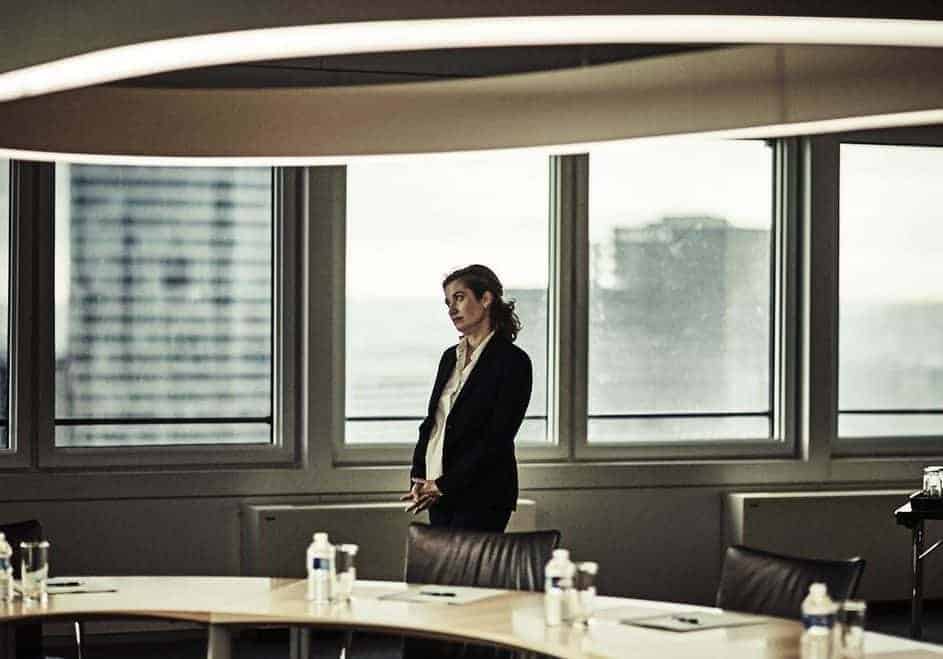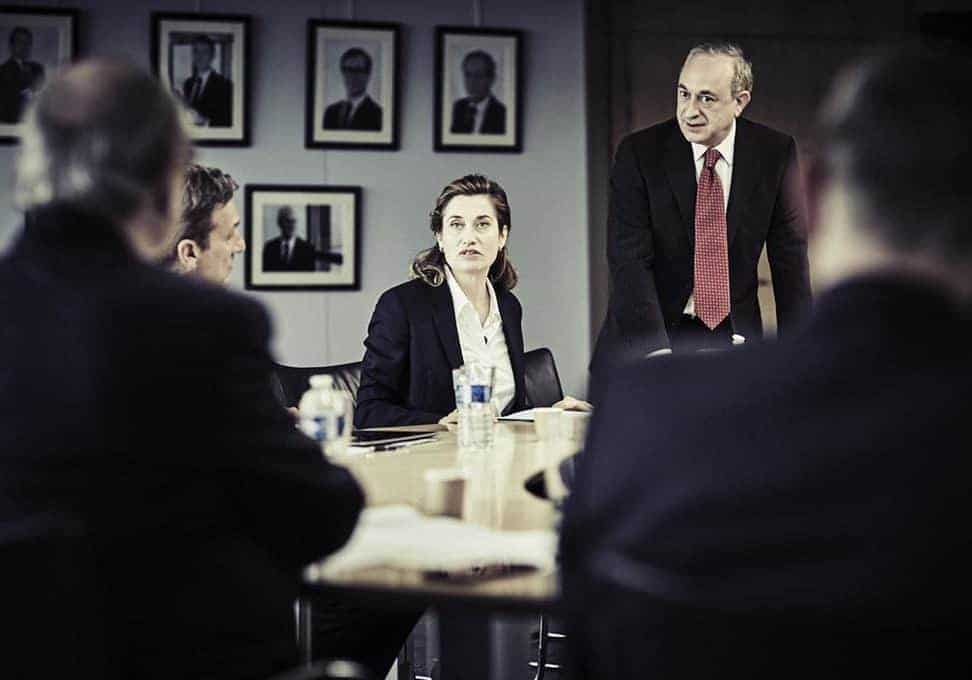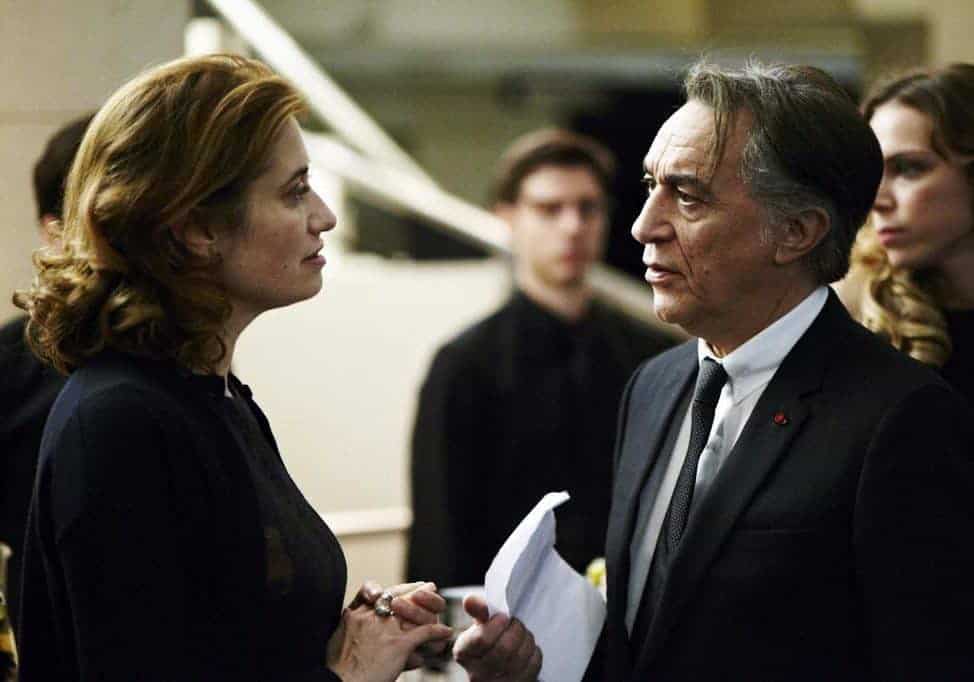Tonie Marshall discusses workplace sexism as she observed it for her film Numéro Une, and the possibilities for feminism after Harvey Weinstein and in the wake of #MeToo.

Centred on a middle-aged woman attempting to become the first woman CEO to reach the CAC 40 — an exclusive category that comprises all the biggest companies in the French industry — Numéro Une might feel timely in the months after Harvey Weinstein’s crimes came out into the open, and the #MeToo movement got the wheels of change turning. But director Tonie Marshall has been making women-centric films for decades — in France, she is most famous for her hit Venus Beauty (1999), following a group of eccentric, unconventional women working at a beauty parlour.
Numéro Une is explicit in its feminism: the film centres on successful businesswoman Emmanuelle Blachey (played brilliantly by French acting legend Emmanuelle Devos), as she is contacted by a feminist group aiming to help her reach the top of the industry, and thus advance the cause of women. But the film is also feminist in its very construction, focusing on a middle-aged woman without taking pity on her. Emmanuelle is ambitious, but not aggressive and macho the way her rival Jean Baumel (Richard Berry) is. Her whole attitude — calm, collected, but not without moments of weakness — is another, refreshing kind of strength.
Marshall was just as eloquent, composed, and good-natured when I met her in January. She talked about the consequences of the Harvey Weinstein revelations and her belief in quotas, the sexism she found in the energy industry; working with younger people, and Catherine Deneuve’s controversial open-letter.
Seventh Row (7R): Obviously, sexism in the workplace isn’t new, but Numéro Une feels rather topical right now.
Tonie Marshall (TM): I started writing the film in 2012-2013, and we had a hard time finding financing because people wondered if it would interest audiences. In 2009, I wanted to make a TV show about this topic — about a feminist club. There were eight main characters, and we would get to see the journey of each of these women — in politics, in industry, in media, in sports… I never found a single TV channel that was interested.
7R: And now?
TM: I don’t know, I will try again. We’ll see. But you know, there is still a certain resistance to letting women do things like that. It might look like things are changing, with people making these big gestures, but… What just happened with #MeToo and Harvey Weinstein means that there will be a before and an after, that’s for sure. But in the big movements for change, we have to keep fighting every day, because there is still a lot of resistance against concrete actions.

7R: In the film, the main character encounters sexism every day in her work. She doesn’t like it, of course, but she doesn’t always get angry. She deals with it in a different way, sometimes even playing the game a little bit. She rolls with the punches, in order to get things done.
TM: She does notice the sexism, but in this kind of world and milieu, you indeed just have to try your best to escape the worst. I researched this environment for two years. I interviewed a dozen of women who had jobs at a high level of responsibility. The sexism that we see in the film, as intense as it is, is based on reality — and I didn’t even include the worst of it.
[click_to_tweet tweet=”‘There will be a before and an after Weinstein, but we have to keep fighting every day, because there is still a lot of resistance against concrete actions.'” quote=”‘There will be a before and an after Weinstein, but we have to keep fighting every day, because there is still a lot of resistance against concrete actions.'”]
One of the women I talked to told me: “Do not hesitate to have your male characters talk very crudely.” We made a version of the film like that, with as much sexism as those women had described to me, but when we watched it we thought, “Oh no, that’s not possible.” Even if all that sexism was true, it gave the impression that the film was made by horrible, sexist old men, because the cinema has this magnifying glass effect. I left a lot of it in, but it’s still not as intense as it is in reality.
7R: In your TV show, you wanted to talk about different work environments. Why did you want to focus on the energy industry in the film?
TM: I had to focus on one character and one milieu. I had already shot a power plant for one of my films, a long time ago, and I find that the world of industry is very photogenic. The film is a profile of this woman who’s an engineer. She has been to some of the most prestigious and most difficult schools — no one can say that she got here by sleeping with men in power. With this character, I could show that even though she has this legitimacy and capacity, she is still going to be faced with condescending remarks, misogyny, and all kinds of obstacles.
[click_to_tweet tweet=”‘The sexism that we see in the film, as intense as it is, is based on reality — and I didn’t even include the worst of it.'” quote=”‘The sexism that we see in the film, as intense as it is, is based on reality — and I didn’t even include the worst of it.'”]
There are the same behaviours in big firms as there are in little construction companies. Both are typically very male milieux. But at the CAC 40, there has never been a woman. There is not a single woman who is CEO of a group that’s in the CAC 40. So it was very symbolic, and it allowed me to shoot wind turbines, to bring in Chinese people — to do things that are great and varied from a cinematic point of view.
7R: In the film, she is approached by a feminist group, and there is the notion of feminine solidarity and sisterhood. But there are also moments when these women doubt each other.
TM: I think there are sometimes doubts on whether a feminist organisation can ever achieve something, and there are extremely different currents of feminism in France. Just now [January 2018], there was this petition; although it was very poorly written, it did show that, even if women agree on many things, they also disagree on many others.

It’s less a case of rivalry, than just there being different ways of thinking about how to approach relationships with men, how to think of the coexistence of men and women, and other things like that. There are black feminist groups who don’t want to include white women, for example. It’s very varied. I deeply believe that, with a few exceptions, women are generally supportive of each other.
7R: There is this cliché that the women who arrive to the top have to be more severe and tough.
TM: Yes, I’ve been told that often. I have the feeling that it’s not about being more or less tough, but that men and women don’t function exactly the same way — they don’t have exactly the same relationship to money, the same rapport with our jobs. “The job” is typically something very masculine. I don’t know why; men are raised that way. And I’ve also observed, and been told, that women don’t have the same way of leading a conversation and giving people the place to speak. We don’t have the same relationship with hierarchy. All of that is very different.
[click_to_tweet tweet=”‘With this character, I could show that even though she has this legitimacy and capacity, she is still going to be faced with condescending remarks, misogyny, and all kinds of obstacles.'” quote=”‘With this character, I could show that even though she has this legitimacy and capacity, she is still going to be faced with condescending remarks, misogyny, and all kinds of obstacles.'”]
If there is only one woman in that environment, she will just have to adapt to the men around her and show that she’s really tough. That’s why I didn’t want to show that in the film. I wanted to show a woman who was competent, powerful, but not a killing machine. That is the cliché, but generally speaking, I don’t think it’s true. But then, as in love, there are women who are very tough; others who are very feminine, and it’s the same for men — there are variations. But globally, I don’t think we function exactly the same way.
[click_to_tweet tweet=”‘I wanted to show a woman who was competent, powerful, but not a killing machine. That is the cliche, but I don’t think it’s true.'” quote=”‘I wanted to show a woman who was competent, powerful, but not a killing machine. That is the cliche, but generally speaking, I don’t think it’s true.'”]
I think it’s necessary to modernise society now, and if we want to do that, we should reach 40-50% of women in positions of responsibility. That would re-organise the way we work, the way we govern, and thus society — and maybe even influence the excesses of certain capitalist powers. Maybe I’m going a little far, but we can imagine that the next big revolution will be about that.
7R: What’s also interesting about the Weinstein allegations is that, obviously, he had been abusing women for years, but the reason it all came out at this moment was that he had economic problems and couldn’t defend himself as well. And this lead to a conversation about how women are paid less than men in the film industry. Numéro Une also shows how this behaviour translates economically.
TM: Yes, of course. In the film, there are really two very different visions of what the company could be. She has a certain way of seeing it, and he has another. Not all companies function the same way; rather, each is directed by a vision.

Usually, when a woman dies or is attacked, practically no one cares. The great virtue of the Weinstein affair is not that it revealed anything, because it didn’t. People already knew he was doing this. The virtue of this story is that, because it happened in Hollywood, many of the victims were famous actresses, so the newspapers and magazines talked about it a lot. And that brought to the light this issue — the sexism of men in power — which in fact concerns many, many women. And so, we were all forced to care.
In the US, a group of farmworker women wrote a letter of support to the women in Hollywood, to talk about their own experience with sexism as farmworkers. The movement has gone beyond Hollywood.
7R: Now, there seems to be a backlash, with the letter written by Brigitte Bardot and Catherine Deneuve talking about a “witch-hunt” against men…
TM: Yes. Well, Brigitte Bardot, I gave up on her a long time ago! But this petition is interesting: it’s very badly written. But it tells us something: careful, our feminism isn’t against men; it took us a long time and a lot of effort to gain our sexual freedom and freedom of seduction, and we are against the moralism, the religion, the communitarianism, and all these other things that are telling women to cover themselves, to stay at home, etc.
[click_to_tweet tweet=”‘Equality would re-organise the work, the way we govern, and thus society — and maybe even influence the excesses of certain capitalist powers.'” quote=”‘Equality would re-organise the work, the way we govern, and thus society — and maybe even influence the excesses of certain capitalist powers.'”]
There is, despite all the progress around us, a sense of regression in France, in terms of sexual freedom, and I think this petition was trying to touch on that. It was trying to alert us to that fact, and warning us against the moral attitude that asks we take down the art from Balthus or Egon Schiele, or Gustave Courbet’s L’Origine du Monde. It had the merit of shaking things up a bit, of reminding us that victimisation isn’t something that is always without risk for everything else. But it really was badly written…
7R: You said that there should be more women in posts of high responsibility. In France, there are often debates about quotas. What’s your position?
TM: I used to tell myself equality would happen naturally, but doing research on the film, I realised that no, it wouldn’t. So I think quotas are a good idea. I know it’s a violent strategy, and there are men who find it very violent.
[click_to_tweet tweet=”‘The great virtue of the Weinstein affair is not that it revealed anything — it didn’t — but that it forced us all to care.'” quote=”‘The great virtue of the Weinstein affair is not that it revealed anything — it didn’t — but that it forced us all to care.'”]
The film was screened in the services of the Prime Minister. Senior officials saw it, and one of them told me: “You know, I was raised to have this job; I worked hard all my life towards it, and when I reach the age where I should get it, they’re going to give it to a woman instead because of a quota?! It’s unfair! I am part of a sacrificed generation.” And I wanted to tell him: “Well, this woman also worked towards this job her entire life!” But you can’t change the subjectivity of someone. Because it’s true that these men are used to having everything! And if we don’t put quotas in place, they won’t just give anything up to anyone else of their own volition. That’s for sure.

What is interesting about this is that it could potentially change the way of governing and the way of organising work. I think that, in younger generations, men are already a little more open to changes. Where it’s really hard is in the generation of men in their 50s-60s. When I talk to them, they look at me with their huge eyes; they’re probably thinking, “This woman is crazy!” For the men a little younger, it’s something they’re already thinking about a little bit. So it will happen, eventually…
7R: And in the film industry?
TM: In the film industry, there is obviously a lot of progress to be made: the salaries aren’t equal between men and women, for one. But France is still the country with the most women directors, proportionally. In our film schools, there are many women.
[click_to_tweet tweet=”‘If we don’t put quotas in place, men won’t just give anything up to anyone else of their own volition. That’s for sure.'” quote=”‘If we don’t put quotas in place, men won’t just give anything up to anyone else of their own volition. That’s for sure.'”]
It’s very complicated to deal with an artistic domain like it’s a company, because there can be a year where there are many films directed by women, and another where there are less. So what are we to do — play bad films directed by women? Art isn’t quantifiable in that way, and it’s not gendered. I like to be told that I made a film about women, but not that I made a woman film. It annoys me. I hate it.
7R: How did this extend to the actual work on set?
TM: I worked with very talented actors, and my team was composed of rather young people: the cinematographer hadn’t made that many things, and neither had the set designer. And it was wonderful. I was carried by these young people who worked hard, who were modern, and who had a slightly different perception of things. It was extremely pleasant for me. On other films before, when I worked with slightly older people, there was this sort of familiar and annoying attitude sometimes. People would be a little lazy and just do the minimum effort. There wasn’t that at all on this film.
Many of the best films we have written about concern sexism in the workplace, a painful injustice in a world that often likes to pretend that equality has been achieved. In Irene Lusztig’s Yours in Sisterhood, contemporary women read letters from readers sent to feminist magazine Mrs. in the ‘70s, and many of these are about sexism at work, or the impossibility for women to get work. Erika Cohn’s The Judge follows the first woman Shari’a judge in the Middle East as she navigates countless sexist obstacles and continues to fight for women who often do not even know their rights. Chloé Robichaud’s Boundaries comes the closest to Numero Une: the film follows three women in politics — each faced with a different kind of sexism at work — as they participate in a negotiation between Canada and a fictional neighbouring country over the use of natural resources.

